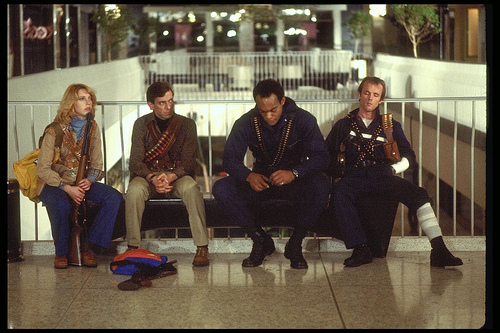One of the films that best captures the utopian anxieties of the Seventies' is Boorman’s addled farrago Zardoz, excellently summarized here on Wikipedia.
Zardoz isn’t alone of course in expressing pessimism about the rationalised, radically egalitarian Utopia that post war consensus seemed to be leading us into, but it is perhaps the one most explicitly anxious about the loss of masculine vitality, death drive, jouissance, call it what you will and it’s replacement with a feminised, infantilized world in which the men have been rendered literally impotent and can do nothing but mooch about for all eternity longing for a bit of violent death to be visited upon them. They have entered the Apollonian purgatory to which a technocratic, managed economy is leading us where one can neither die of starvation nor boredom.


The thing about the worlds of these Seventies' utopias is that people (or at least, the elites) really do enjoy equality and abundance, material comfort and personal liberation especially in sexual relations, though without taboo or danger these sexual freedoms themselves lose frisson, become dryly technical, passionless encounters. Connery in Zardoz represents the jaded bourgeois eternal longing for a bit of rough, but also, as Phil Knight would have it, the need for sterile, juiceless metropolitan centres to suck some manna and mojo in from the hinterlands, the untermensch, the subaltern. In one sense the decadent, soft and feminized centre in languorous disavowal invites in the barbarian hordes to put it to the sword.
%2Blab.jpg)
These Utopias can not last, are always ambivalent, are based on blood or coercion, exclusion, some "noble lie" or subtle forms of ideological programming, a kind of soft totalitarianism, the fear of social control not as Big Brother but a castrating Big Mother. But beyond its masculinist paranoia, the terror at succumbing to ease and pleasure, the oppressive guilt of having abandoned struggle and the warrior code Zardoz does get at the tensions of the Sixties, both for the systematic derangement of the senses, the refusal to police desire, liberation and also the demand for radical equality and peaceful cohabitation. They will ultimately be corrupted either from without or within, or both, even the deeply ambiguous Utopia of Romero’s shopping mall in Dawn of the Dead has its wall breached by the Hell’s Angels. Human beings just aren't built for Utopia. They always and everywhere dream of scaffolds.

After Zardoz, Westworld, Logan’s Run, Woody Allen’s sublime Sleeper, these clean and almost workless worlds Keynes imagined the great-grandchildren he never had inhabiting, we get primarily, in film at least, dystopia, corporate dystopias in effect, and we also get a great deal of the post-apocalyptic. Awful visions of course, but also thrilling, they admit at least of adventure and heroism, by which we mean violence, by which we mean conquest. Thank god we have escaped a future of drifting through geodesic domes in glittery cubist togas, have revived the frontier spirit and can at last achieve a true Utopian Liberty.
Now that I've read this, it certainly puts this scene (the virile man from the past putting the funk and boogie into the sterile technoutopian future) into context!
ReplyDeletehttps://www.youtube.com/watch?v=NcfnRl0Gwcc